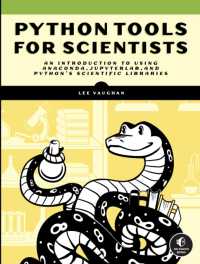- ホーム
- > 洋書
- > 英文書
- > Literary Criticism
Full Description
A collection of original essays establishing how wide the intellectual boundaries of narrative theory have become
The Edinburgh Companion to Contemporary Narrative Theories showcases the latest approaches to diverse narratives across many media and in numerous disciplines. Attending to literary, digital, visual, cinematic, televisual, and aural forms of storytelling, this book brings founders of the field of post-classical narrative theory together with senior and emerging scholars.
This is the first anthology to consider what narrative is and what it can do in the wake of various turns in literary studies which have been appearing in the context of digital media and algorithmic capital. From mind-centred and philosophical approaches to theories focusing on gender, race, and sexuality, the chapters touch on poetry, drama, digital games, podcasts, coding, speculative fiction, the law, medical narrative, oral storytelling, and comics as well as the more traditional areas of fiction, TV, and film. This is the future of narrative theory.
Key Features:
Includes popular culture genres (comics, video games, coding) not covered in depth in other companions to narrative theoryShowcases essays on narrative dimensions of law, medical ethics, linguistics, and philosophy as well as more obviously narrative genresAttention given to race, gender, sexuality distributed throughout the volume, not isolated in a single sectionNew essays by superstars in narrative theory (Phelan, McHale, Lanser, Richardson, Abbott, Currie) as well as other well respected and emerging scholars
Contents
List of Illustrations
Notes on Contributors
Introduction
Part I. Mind-centred and Cognitive Approaches to Narrative
Chapter 1. H. Porter Abbott, 'What Does It Mean to Be Mad? Diagnosis, Narrative, Science, and the DSM'
Chapter 2. Marco Caracciolo, 'The Nonhuman in Mind: Narrative Challenges to Folk Psychology'
Chapter 3. Suzanne Keen, 'Narrative and the Embodied Reader'
Chapter 4. Karin Kukkonen, 'The Fully Extended Mind'
Chapter 5. Merja Polvinen, 'Sense-Making and Wonder: An Enactive Approach to Narrative Form in Speculative Fiction'
Part II. Situated Narrative Theories
Chapter 6. Claudia Breger, 'Cosmopolitanism, Controversy, and Collectivity: Zadie Smith's Networked Narration'
Chapter 7. Sue J. Km, 'Race and Empathy in GB Tran's Vietnamerica'
Chapter 8. Susan S. Lanser, 'Till Death Do Us Part: Embodying Narratology'
Chapter 9. Sam McBean, 'Digital Intimacies and Queer Narratives'
Chapter 10. Valerie Rohy, 'The Cinema of the Impossible: Queer Theory and Narrative'
Part III. Theories of Digital Narrative
Chapter 11. Zara Dinnen, 'Cinema and the Unnarratability of Computation'
Chapter 12. Rob Gallagher, 'Plotting the Loop: Videogames and Narratability'
Chapter 13. Ellen McCracken, 'Serial as Digital Constellation: Fluid Textuality and Semiotic Otherness in the Podcast Narrative'
Chapter 14. Daniel Punday, 'UI Time and the Digital Event'
Part IV. Theories of Television, Film, Comics, and Graphic Narrative
Chapter 15. Jan Baetens and Hugo Frey, 'Continued Comics: The 'New Blake and Mortimer' as an Example of Continuation in European Series'
Chapter 16. Jason Mittell, 'Operational Seriality and the Operation of Seriality'
Chapter 17. Katalin Orbán, 'Closer Than They Seem: Graphic Narrative and the Senses'
Chapter 18. Sean O'Sullivan, 'Episode Five, or When Does a Narrative Become What It Is?'
Chapter 19. Christian Quendler, 'Media Theory as Narrative Theory: Film Narration as a Case Study'
Part V. Anti-Mimetic Narrative Theories
Chapter 20. Alice Bell and Astrid Ensslin, 'Digital Fiction and Unnatural Narrative'
Chapter 21. Stefan Kjerkegaard, 'Lyric Poetry as Anti-Mimetic Bridging in Narratives and Motion Pictures: A Case Study of Affective Response to Christopher Nolan's Interstellar (2014)'
Chapter 22. Brian McHale, 'Speculative Fiction, or, Literal Narratology'
Chapter 23. Brian Richardson, 'Unnatural Endings in Fiction and Drama'
Part VI. Philosophical Approaches to Narrative
Chapter 24. Mark Currie, 'Narrative and the Necessity of Contingency'
Chapter 25. James Phelan, 'Local Nonfictionality within Generic Fiction: Huntington's Disease in McEwan's Saturday and Genova's Inside the O'Briens'
Chapter 26. Ruth Ronen, 'The Story of the Law'
Chapter 27. Richard Walsh, 'The Centre for Narrative Gravity: Narrative and the Philosophy of Selfhood after Dennett'
Chapter 28. Amy Shuman and Katharine Young, 'The Body as Medium: A Phenomenological Approach to the Production of Affect in Narrative'








